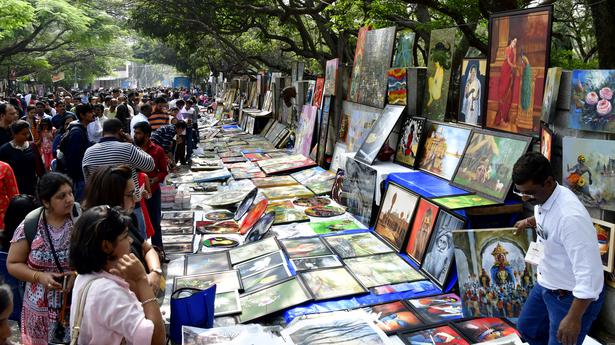
Chitra Santhe to be held in Bengaluru on March 27
The Hindu
After an online event last year due to the pandemic, the 19th edition of Bengaluru’s popular street art festival, Chitra Santhe, organised by the Karnataka Chitrakala Parishat, will be back on March 27. The theme will be dedicated to ‘freedom fighters’ to mark 75 years of India’s Independence.
As many as 1,500 artists from across India are expected to participate in the santhe, which will be inaugurated by Chief Minister Basavaraj Bommai, said chitrakala parishat president B.L. Shankar at a press conference on Wednesday.
Stalls will be set up from Windsor Manor Hotel up to Shivananda Circle and a part of Crescent Road. There will also be live performances by students from the parishat’s College of Fine Arts. The festival will be held in adherence to COVID-19 guidelines. “Last year, the santhe was hosted online for two months and was dedicated to corona warriors,” said Mr. Shankar.
Apart from the santhe, the works of selected artists will be exhibited for 10 days in the 12 galleries of the parishat. The Chitrakala Samman awards will be conferred on four artists.
Meanwhile, Prasiddha Foundation founded by dancer Prathibha Prahlad is organising a cultural festival, ‘Eka Aneka’, in collaboration with CKP on March 1 on the occasion of Maha Shivaratri.

 Run 3 Space | Play Space Running Game
Run 3 Space | Play Space Running Game
 Traffic Jam 3D | Online Racing Game
Traffic Jam 3D | Online Racing Game
 Duck Hunt | Play Old Classic Game
Duck Hunt | Play Old Classic Game

















